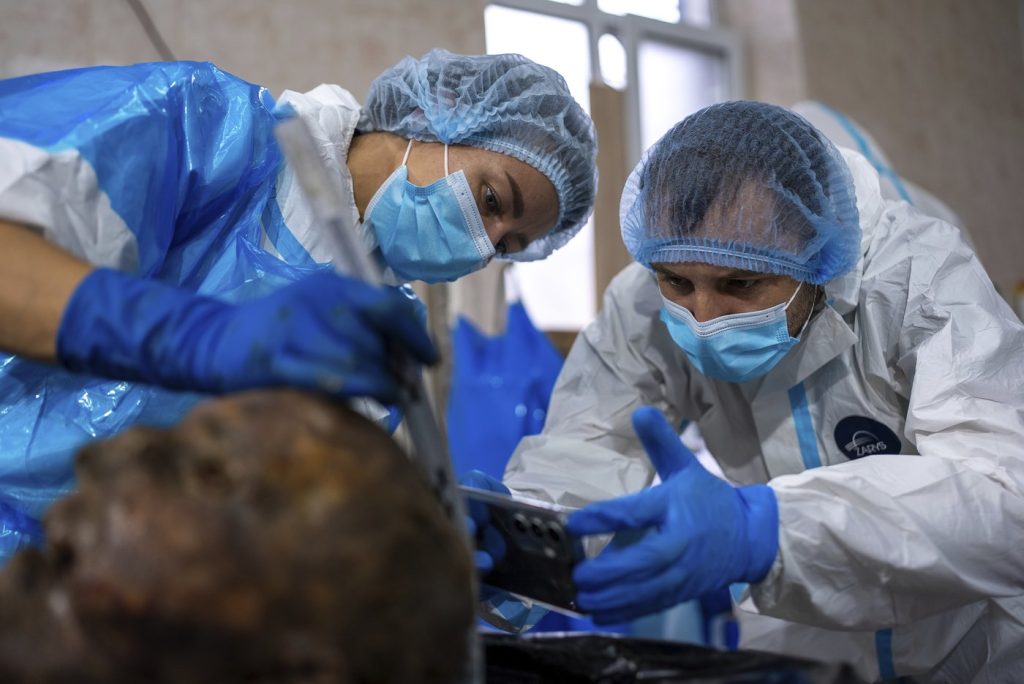More than 200 Ukrainian prisoners of war (POWs) have died in Russian prisons since the full-scale invasion of Ukraine began in February 2022. Human rights organizations, U.N. officials, and Ukrainian government representatives attribute many of these fatalities to severe abuse inside the prisons. This has led to claims that Russia is systematically brutalizing captured soldiers.
Ukrainian authorities have highlighted that the bodies of returning deceased POWs are often mutilated and decomposed, suggesting a deliberate effort by Russia to hide evidence of torture, starvation, and inadequate healthcare in the prisons and detention centers across Russia and occupied regions of Ukraine. In light of these discoveries, Ukraine is preparing to file war crimes charges against Russia at the International Criminal Court. This will utilize testimonies from former POWs as well as autopsy evidence from repatriated bodies.
Despite numerous requests for comment, Russian officials have not responded. In previous statements, they have accused Ukraine of mistreating Russian POWs. The U.N. has partially validated some of these allegations but emphasized that instances of violations by Ukraine are significantly less frequent and severe when compared to those committed by Russia.
A 2024 U.N. report indicated that 95% of released Ukrainian POWs had experienced "systematic" torture and ill-treatment during their captivity. Reports from released prisoners detail horrific experiences, including beatings, electric shocks, sexual violence, mock executions, and sleep deprivation. Danielle Bell, the U.N.'s leading human rights monitor in Ukraine, described such conduct as "unlawful."
This year, Amnesty International also documented extensive torture inflicted upon Ukrainian POWs imprisoned in Russia. The organization criticized Russia for maintaining secrecy about the conditions and locations of POWs, depriving rights groups and healthcare workers of access and leaving families unaware of their loved ones' welfare for extended periods.
Recent prisoner exchanges between Russia and Ukraine have revealed that of the over 5,000 POWs repatriated by Russia, at least 206 died while in captivity. Among these deaths, more than 50 occurred due to an explosion at a Russian-controlled prison. Additionally, Ukrainian prosecutors indicated that 245 Ukrainian POWs were killed on the battlefield by Russian forces.
The death toll among POWs is projected to rise as more bodies are returned and identified. However, forensic experts face numerous obstacles in establishing precise causes of death. In many cases, internal organs are missing, and there are signs that injuries may have been concealed or treated improperly.
Inna Padei, a forensic specialist in Kyiv, has performed autopsies on numerous repatriated POWs, receiving their remains in black plastic bags delivered by refrigerated trucks. One body she recently examined displayed a small fracture on the skull, indicating a violent impact that could have been fatal. Padei stated that these injuries, while not always the direct cause of death, suggest the use of excessive force and torture.
Interviews conducted with families of 21 Ukrainian POWs who died in captivity reveal a grim picture. Autopsies show that five of these individuals suffered cardiac failure, some being as young as 22, while others succumbed to diseases such as tuberculosis and pneumonia. Additionally, several deaths were attributed to various forms of trauma, including a traumatic head injury.
One poignant story is that of Ukrainian soldier Serhii Hryhoriev, who consistently reassured his family during phone calls with promises of safety and well-being. Tragically, when he was finally repatriated, it was in a body bag. While a Russian death certificate claimed he had died of a stroke, Ukrainian autopsy results suggested that he suffered a violent death exacerbated by medical neglect during his captivity.
During his imprisonment at the Kamensk-Shakhtinsky Correctional Colony, fellow inmate Oleksii Honcharov witnessed Hryhoriev suffering regular beatings and experiencing significant physical decline. Rather than receiving medical care, he was isolated in a small, dark cell, leading to his untimely death attributed to internal bleeding from blunt trauma.
In a heartfelt tribute, Hryhoriev’s family has tattooed the phrase “everything will be all right” on their wrists as a reminder of his enduring optimism, even in such a heartbreaking situation.
This troubling situation highlights the severe challenges faced by Ukrainian POWs in Russian captivity and raises urgent concerns about the treatment of individuals caught in the conflict.










